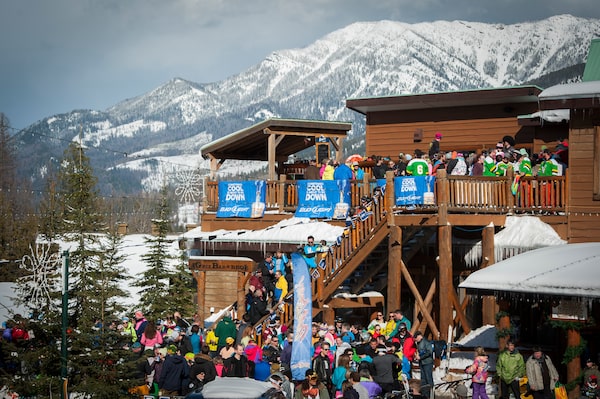
Skiers take part in the Retro Weekend at the Fernie Alpine Resort in March, 2018. Fernie is the largest community in the Elk Valley, and a popular spot for vacation homes.The Canadian Press
A handful of Canadian communities that rely on tourists and people with vacation homes to keep their economies humming are begging outsiders to stay away, with measures ranging from roadblocks to pleas detailing how local health facilities could be overwhelmed by visitors.
Some areas have geographical advantages. Tla-o-qui-aht First Nation members, for example, were stopping cars on the highway Tuesday toward the Tofino-Ucluelet region, on Vancouver Island’s west coast. Meanwhile, mountain towns near B.C.'s eastern border are urging Albertans to stay away.
The requests are pro-active and coated with diplomacy. They urge tourists to stay home as the coronavirus that causes COVID-19 spreads, all while encouraging them to return – and spend money – in their communities soon. They reflect the broader challenge COVID-19 created: how to balance the economy and public safety.
Albertans, particularly Calgarians, frequent border areas such as B.C.'s Elk Valley and the Columbia Valley. Fernie is the largest community in the Elk Valley, and a popular spot for vacation homes. The Columbia Valley plays host to places like Radium Hot Springs and Invermere, two other major vacation destinations.
“This is not the time for a lot of heavy traffic coming to the Columbia Valley,” Al Miller, Invermere’s mayor, said. “Our hospital is small and we wouldn’t be capable of handling a large population."
The request came with a caveat, highlighting how the area’s economy depends on visitors: “We do love Alberta," Mr. Miller said.
William Brown, a physician in the region, posted a letter on Facebook, asking Albertans to stay on their side of the boundary. The letter said the area’s hospital has only eight beds and only eight full-time doctors cover the emergency department, clinics and hospital patients.
“We only have one ventilator!” the letter said. “Our town is small and isolated and our closest intensive care unit will likely be strained with our regional cases.”
It is also difficult, Dr. Brown wrote, to transfer patients between provinces at the best of times. The person who answered the phone at Dr. Brown’s office said the physician would not comment on the letter.
Karl Hardt, a spokesman for B.C.'s Interior Health Authority, noted Canadians are free to travel within the country, but should adhere to coronavirus protocol. “Individuals who have COVID-19 or COVID-19 symptoms should self-isolate and not travel,” he said in a statement.
Ange Qualizza, the mayor of Fernie, hopes Albertans with second homes in the Elk Valley will stay away. “We should all be staying put,” she said in a statement.
There were 119 confirmed cases of COVID-19 in Alberta as of Wednesday afternoon. Of those, 83 are in Calgary. There were 231 cases in B.C. as of Wednesday afternoon. Canada has closed its borders, with exceptions for essential travel and to Canadian citizens and permanent residents returning to the country. Prime Minister Justin Trudeau on Wednesday expanded the travel ban to include American visitors.
Meanwhile, the Tla-o-qui-aht First Nation members who erected a blockade Tuesday are no longer there, according to Elmer Frank, one of TFN’s emergency co-ordinators. “The approach could have been more strategically planned,” he said. TFN is doing what it can to protect members. It is, for example, limiting access to Esowista, one of its reserves.
Further, three organizations in Tofino – the district of Tofino, Tourism Tofino and the Tofino-Long Beach Chamber of Commerce – put out a joint statement Wednesday urging outsiders to stay away for several weeks and that travellers already in town make plans to leave.
“I am a local health care provider, and we have to concentrate on meeting the health needs of our communities at this time,” Laura McDonald, president of Tofino’s chamber of commerce, said in a statement.
A number of other Indigenous communities have issued travel advisories. “With all due respect, we do NOT encourage any visit from outside of Takla [Nation] into the community for the safety of our elders” and those with weak immune systems, Chief John French said in a statement posted on Facebook.
Officials on Haida Gwaii, an archipelago off B.C.'s west coast, last week urged islanders to stay away from the mainland. “Preparedness and prevention are the most effective ways to limit exposure and potential impacts in our Island communities,” the Council of the Haida Nation, Old Massett Village Council, and Skidegate Band Council, said in a statement.
Sign up for the Coronavirus Update newsletter to read the day’s essential coronavirus news, features and explainers written by Globe reporters.
 Carrie Tait
Carrie Tait